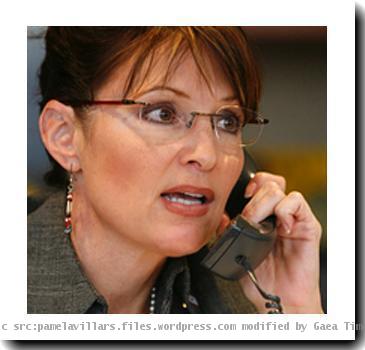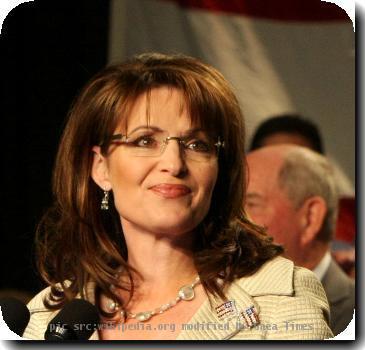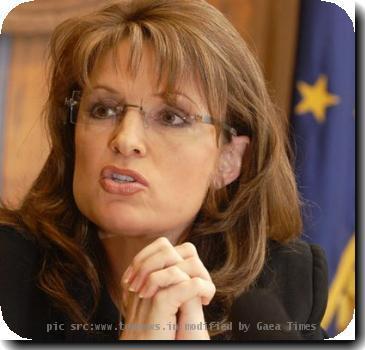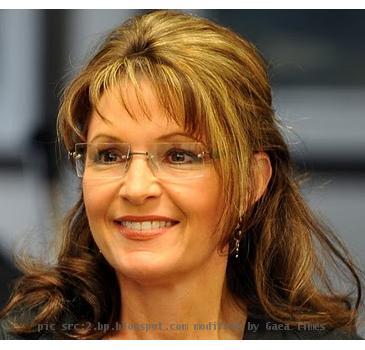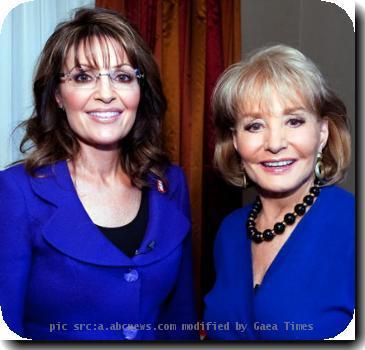Palin seizes center stage in politics, but what about a presidential bid in 2012?
By Becky Bohrer, APFriday, July 2, 2010
Palin center stage in politics, but what of 2012?
JUNEAU, Alaska — Sarah Palin isn’t going to fade away.
Someone else in her position might have. Two years after the vice presidential nomination made her a star, the 2008 campaign is fading in memory. She’s not even Alaska’s governor anymore; she abruptly resigned that post a year ago. But she’s evolved into an enduring political personality writ large — and now the talk, growing louder, is of her own run for the White House in 2012.
She’s still a phenomenon. She can command weeks of headlines for a single Facebook observation — see health care “death panels” — and six-figure speaking fees from groups clamoring for her words. “Going Rogue,” her best-selling memoir, added to her luster among the conservative faithful. And in this congressional election year, she has easily eclipsed other Republicans as provider of the most coveted endorsement.
Palin is everywhere: in South Carolina, campaigning for gubernatorial hopeful and fellow “mama grizzly” Nikki Haley; in Nevada, stoking the anti-establishment sentiment of the tea party movement; in Arizona, defending a controversial state law cracking down on illegal immigrants.
There are two stops she has yet to make in 2010 — Iowa and New Hampshire, the first major prizes of the presidential campaign. But she knows the way: She campaigned in New Hampshire in 2008 and was in Iowa for a book-signing event last December.
Republican strategists and activists in those states, as well as battlegrounds such as Florida, say Palin has a realistic shot at becoming the GOP presidential nominee in 2012, given her fan base and knack for drawing media coverage everywhere she goes. Fifty-eight percent favored Palin in last month’s Iowa poll of likely Republican voters, putting her behind party veteran Mitt Romney but slightly ahead of Newt Gingrich.
Whether she could win the presidency is another matter.
Palin, for all her populist appeal, is highly polarizing, dismissed by critics and even some Republican aides who worked on the 2008 McCain-Palin presidential campaign as an out-of-her-league lightweight. The most recent Associated Press-GfK poll showed that 52 percent of those surveyed viewed her unfavorably while 45 percent viewed her favorably.
But Sid Dinerstein, GOP chairman in Florida’s Palm Beach County, is among those who love Palin.
He has a signed picture of himself with her and argues that she was the only one of the four candidates in the 2008 election qualified to be president. Still, he doesn’t want her to run in two years.
“She is currently the single most powerful political person in the country,” he said. “The day she announces for president, she gives that up.”
It’s not that she shouldn’t run, someday, says Dinerstein. Given what he considers the unfair pounding she took from the national media in 2008, Dinerstein says she could benefit from a bit more distance. He cites the fresh look he believes Gingrich is getting, years after the Georgian was a political lightning rod as House speaker.
If she does run for president in 2012, how might she go about it?
Palin’s path probably would begin in Iowa, where her far-right positions could play well with the legions of conservatives who make up the Republican electorate.
But the state is an unforgiving place for female candidates. It’s one of just two — Mississippi is the other — never to have elected a female governor or sent a woman to Congress. Democrat Hillary Rodham Clinton finished third there in the 2008 caucuses.
David Roederer, who ran John McCain’s campaign in Iowa in 2008, says Palin would do well in the state, where grass-roots politics matter and the caucuses tend to be a winnowing-out of the weaker candidates.
“I think Republicans see her as a very genuine, down-to-earth person,” he said. “That sure helps you win elections. (But) that in and of itself won’t.”
Palin endorsed former Gov. Terry Branstad in the recent Republican gubernatorial primary, a nod to the more mainstream candidate that angered some in the tea party movement. Roederer called it a “shrewd move,” should she decide to run for president. Branstad won, and he’ll face one of the more vulnerable Democratic governors, Chet Culver, this fall.
If Palin does make a serious run for president, Bob Haus, a longtime political strategist in Iowa, suggests she not wait too long. In 2008, Haus worked for Fred Thompson, the much-buzzed-about candidate who got in late and fizzled fast.
“You don’t have to be out there two-plus years in advance,” he said. But once a decision’s made, “you have to commit maximum resources. This is a huge undertaking, one of the toughest job application processes in the world because it’s probably the toughest job in the world.”
In New Hampshire, Phyllis Woods, a Republican National Committeewoman from Dover, ticks off the names of potential candidates who have been well-received in visits to the state: Romney, Indiana Rep. Mike Pence, Minnesota Gov. Tim Pawlenty, former Pennsylvania Sen. Rick Santorum.
While Palin hasn’t been on the local radar in recent months, Woods said there are many in the state who like her a lot.
“I think absolutely anybody could be the nominee or has the right to run,” she said. “As the vice presidential nominee two years ago, I think the potential is there that there could be support.”
Palin has been noncommittal about her intentions, saying only that she is keeping all options open. In recent weeks, however, she has stepped up her criticism of Obama’s leadership and focused on her own credentials.
To be considered “she will have to do a better job of developing policy she is for, beyond the standard operating procedure for Republicans: less taxes, less spending, less government, more freedom,” said David Johnson, a GOP strategist based in Tallahassee, Fla.
Her immediate focus, aides say, is on 2010 and getting conservatives elected. So far this primary season, she’s scored some high-profile wins, including with Haley in South Carolina. She has another book in the works, an enviable spot as a Fox News contributor, a travelogue TV series on the way and a schedule on the speaking circuit. She reportedly has made at least $12 million from the book and other media deals, much more than her annual governor’s salary of $125,000.
“I think if you want to look at what motivates Sarah Palin, it’s that the country is seriously on the wrong track,” said Rebecca Mansour, a consultant to her political action committee. “There’s also the issue of, if you’re given a megaphone and able to speak out on something positive, it would be a shame not to use it.”
Palin’s comfortable position is a far cry from the place she’d landed right after the 2008 election.
She faced a barrage of ethics complaints (most later dismissed). Her teenage daughter had a baby, further stoking tabloid interest in her family’s life. She had bitter fights with Alaska’s legislature. There were complaints Palin had gone Hollywood, that her heart was no longer in the job.
Her words and actions still remained fodder for comic actress Tina Fey.
Palin said she felt besieged then, but she had no intention of disappearing.
In announcing her resignation on July 3, 2009 — the timing around Independence Day intentional, and symbolic — she pledged to fight for the state and nation in other ways by advocating everywhere for less government and individual rights.
And running for president? Well, she hasn’t said.
“I’ve never believed that I, nor anyone else, needs a title to do this, to make a difference, to help people,” she said.
Tags: 2012 United States Presidential Election, Alaska, Campaigns, Events, Facebook, Florida, Iowa, Juneau, New Hampshire, North America, Political Endorsements, Political Resignations, Sarah palin, United States
